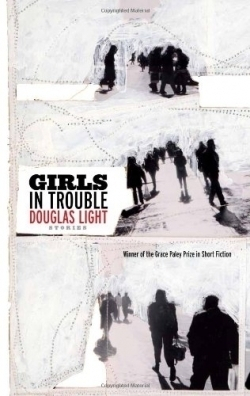Girls in Trouble
The girls are, as the title states, in trouble. In this kaleidoscopic collection of thirteen short stories which won the Grace Paley Prize for Short Fiction, Benjamin Franklin Fiction Award winner Douglas Light deftly explores the rocky terrain of human emotion. In “Zebra,” Kinnia grapples with her mother’s death, her new family and their discontents, and her blossoming sexuality; these issues provoke her to contemplate her own identity while riding the subway in Manhattan and “she wonders if she is human or something else, something alien that registers at a light wave lower than what most can see.”
In the most subtle of manners, Light portrays the essential paradigm of adolescence: while it’s a state of being, it is also a state of invisibility and discovery, as Kinnia realizes. Though most of the stories in this collection probe at the emotional psyche, not all do it as explicitly as “Zebra.”
In “Breaking Up,” a male narrator chronicles the demise of various relationships with many women. Instead of sounding arrogant and self-involved, however, the nameless character sounds poignant. He proclaims, “But tell me again, how did we get to talking about this? I’m sorry but tell me how we got to talking about breakups.” The simple and apologetic voice is authentic and compelling.
In “Aching Hours,” Light portrays a couple that develops a heroin habit, and reveals the effects of rehabilitation on their relationship.Less than five pages long, this story could undoubtedly be considered “flash fiction.” Yet, Light manages to condense powerful feelings within it: we are told that each morning “she wakes violently, certain she’s heard his name” after he stands outside the door and calls her name. The depth of the relationship and its implications are revealed most effectively in its aftermath.
Operating like a scientist throughout these examinations, Light probes beneath complex layers of what it means to be alive, revealing the occasionally magnificent terrain of selfhood.
Reviewed by
Bracha Goykadosh
Disclosure: This article is not an endorsement, but a review. The publisher of this book provided free copies of the book to have their book reviewed by a professional reviewer. No fee was paid by the publisher for this review. Foreword Reviews only recommends books that we love. Foreword Magazine, Inc. is disclosing this in accordance with the Federal Trade Commission’s 16 CFR, Part 255.

